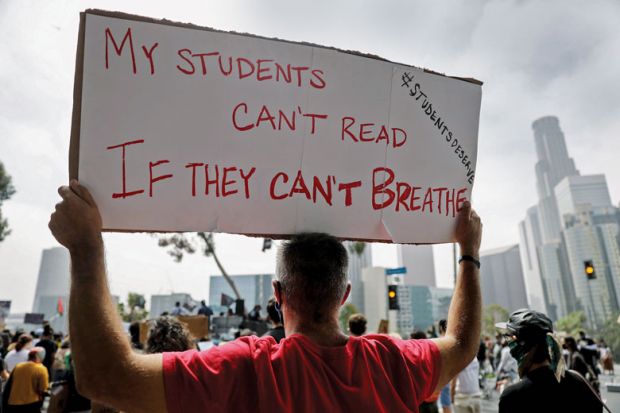One year into the George Floyd era, US students seeking improvements in their campus racial climate are identifying a formidable source of institutional inertia: their predecessors.
At the University of Texas at Austin, an attempt to replace the school song over its racist origins is being fought by a coalition of affluent and prominent alumni.
At the University of Richmond, a wealthy alumnus heading the board of trustees is among former students blocking the renaming of two buildings on campus honouring a slaveholder and a white supremacist.
And at Vanderbilt University, students organised a boycott of a recent alumni-focused donation campaign, feeling that the status quo was not producing sufficient concern for the welfare of their most marginalised classmates.
The power of politically active alumni was proving frustrating for students seeking a more racially harmonious environment on various US campuses, said Alberto Martínez, a professor of history at the University of Texas.
“This all has to do with controlling the agenda and the future of the university,” Professor Martínez said.
While alumni may represent a considerable reservoir of anti-equity inertia in the year since police killed Mr Floyd in Minneapolis, the underlying dynamic has deep roots in higher education.
One of its most familiar forms is legacy preferences, through which Ivy League-tier institutions have long preserved racial and economic disparities by granting alumni admissions preferences for their children.
Structurally, a key power source for alumni across various categories of universities is their service on institutional boards of trustees, as seen at Richmond. There, the board’s rector is Paul Queally, a venture capitalist who along with his wife, fellow Richmond alumnus Anne-Marie, has donated at least $20 million (£14.3 million) to the university and has his name on three Richmond buildings.
Mr Queally has worked to maintain on campus buildings the names of Robert Ryland, a 19th-century slaveholder and the university’s founding president, and Douglas Southall Freeman, a 19th-century racial segregationist and Richmond trustee.
In meetings on the matter, Mr Queally was widely reported to have said he wanted “to help black, brown and ‘regular’ students”. The Richmond faculty senate responded with a unanimous vote of censure. As at Vanderbilt, Richmond students joined the fight by organising boycotts of philanthropic campaigns aimed at funding their own institution.
The student demands at Vanderbilt are broad, covering issues that include the closing of an environmental policy centre and the alleged mistreatment of student organisations.
At Texas, the demands seek the renaming of several campus facilities and new efforts to improve diversity, with the focal point being opposition to The Eyes of Texas, the century-old school song with origins in Confederate nostalgia and racist minstrel shows.
Current students are battling a coalition of wealthy Texas alumni and other donors who defend keeping the song, which has become a fixture at football games.
There are, of course, alumni on both sides of such debates. But as the Richmond case shows, a minority wielding power through the trustees can block a clear majority preference, said Christopher Wiggins, a 2003 graduate who backs the renaming of the two buildings.
Such people “either claim that they feel enough progress has been made and ‘racism is over’ because they claim they don’t see it in their daily lives, or they don’t want to “erase history’”, he said.
But a minority group of alumni and allies committed to “venerating white supremacists” can’t win over the long run, and they were damaging the university in the meantime, Mr Wiggins said. “I truly can’t see any upside for the opposition,” he said.
Register to continue
Why register?
- Registration is free and only takes a moment
- Once registered, you can read 3 articles a month
- Sign up for our newsletter
Subscribe
Or subscribe for unlimited access to:
- Unlimited access to news, views, insights & reviews
- Digital editions
- Digital access to THE’s university and college rankings analysis
Already registered or a current subscriber?








